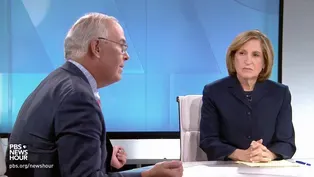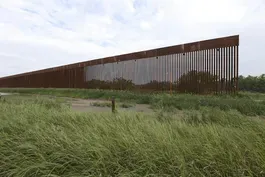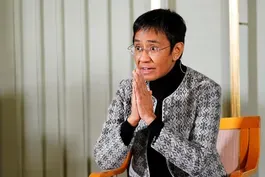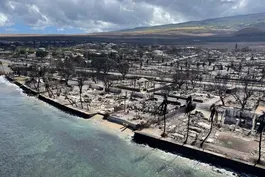
Nobel Peace Prize bolsters activist's call for human rights
Clip: 10/6/2023 | 6m 52sVideo has Closed Captions
Nobel Peace Prize for jailed Iranian activist bolsters her call for human rights
This year's Nobel Peace Prize was awarded to one of Iran’s most prominent, persecuted and persistent human rights activists. Nargis Mohammedi is in detention in Iran’s notorious Evin Prison, for “spreading anti-state propaganda.” But Iranian efforts to silence her have only made her voice louder. Nick Schifrin discussed Mohammedi's message with Summer Lopez.
Problems with Closed Captions? Closed Captioning Feedback
Problems with Closed Captions? Closed Captioning Feedback
Major corporate funding for the PBS News Hour is provided by BDO, BNSF, Consumer Cellular, American Cruise Lines, and Raymond James. Funding for the PBS NewsHour Weekend is provided by...

Nobel Peace Prize bolsters activist's call for human rights
Clip: 10/6/2023 | 6m 52sVideo has Closed Captions
This year's Nobel Peace Prize was awarded to one of Iran’s most prominent, persecuted and persistent human rights activists. Nargis Mohammedi is in detention in Iran’s notorious Evin Prison, for “spreading anti-state propaganda.” But Iranian efforts to silence her have only made her voice louder. Nick Schifrin discussed Mohammedi's message with Summer Lopez.
Problems with Closed Captions? Closed Captioning Feedback
How to Watch PBS News Hour
PBS News Hour is available to stream on pbs.org and the free PBS App, available on iPhone, Apple TV, Android TV, Android smartphones, Amazon Fire TV, Amazon Fire Tablet, Roku, Samsung Smart TV, and Vizio.
Providing Support for PBS.org
Learn Moreabout PBS online sponsorshipAMNA NAWAZ: Today, the Nobel Peace Prize was awarded to one of Iran's most prominent human rights activist.
Narges Mohammadi is in detention in Iran's notorious Evin prison for -- quote -- "spreading anti-state propaganda."
But, as Nick Schifrin reports, Iranian efforts to silence her have only made her voice louder.
NICK SCHIFRIN: The young Iranians who have protested their governments stand on the shoulders of 51-year-old Narges Mohammadi.
For three decades, she has fought for women's rights, minority rights and against the death penalty.
She protested when few were willing, created civil rights organizations when few existed, all hoping one day to create a democratic Iran, as she said on her 50th birthday last April, before returning to prison.
NARGES MOHAMMADI, Human Rights Activist (through translator): I think my fellow countrymen and women are now more aware and willing than ever to achieve democracy after 100 years of struggle.
NICK SCHIFRIN: From prison, she supported last year's protests, the largest in more than four decades, whose slogan was "Woman, Life, Freedom."
And this week, she criticized the government over this incident, a 16-year-old girl not wearing a hijab dragged off a subway train unconscious.
BERIT REISS-ANDERSEN, Chairwoman, Norwegian Nobel Committee: Women, life, freedom.
NICK SCHIFRIN: Today in Oslo, Norwegian Nobel Committee Chair Berit Reiss-Andersen said Mohammadi exemplified Iranian struggle.
BERIT REISS-ANDERSEN: The Norwegian Nobel committee wishes to honor her courageous fight for human rights, freedom and democracy in Iran.
NICK SCHIFRIN: Mohammadi's activism has come at an enormous personal cost.
Her twins are now 16.
She hasn't held them in more than seven years.
And she hasn't seen her husband, Taghi Rahmani, in person for more than a decade.
Today, from his home in Paris, he said detention makes his wife more determined.
TAGHI RAHMANI, Husband of Narges Mohammadi (through translator): This Nobel Peace Prize will open a door for Narges' motivation in fighting for human rights.
It will make her fearless.
This prize actually belongs to the people of Iran.
NICK SCHIFRIN: In total, she's been arrested 13 times and sentenced to 31 years.
But, this year, Mohammadi told The New York Times: "Prison walls might keep me confined, but I look above the walls to the future."
In a statement from Evin prison, Mohammadi today said: "I will continue to fight against the relentless discrimination, tyranny and gender-based oppression by the oppressive religious government until the liberation of all women."
Joining me now from New York is Summer Lopez, the chief program officer of PEN America, which fights to protect free expression.
She is also part of the free Narges Campaign.
Summer Lopez, thank you very much.
Welcome to the "NewsHour."
How important is this prize for Mohammadi and her family?
SUMMER LOPEZ, PEN America: Thank you for having me, Nick.
I think this prize is tremendously important.
We know that these sorts of forms of recognition can really be galvanizing and give energy to people who are being held in prison and are struggling against repression.
We know that it can inspire them to keep going and remind them that the world is with them, that their government's attempts to silence them and keep them in dark corners are unsuccessful.
NICK SCHIFRIN: And she, of course, has been advocating for the ongoing protests in Iran.
What does it mean or what does this prize mean for those people who are still fighting for the cause that she has been fighting for, for decades, and so many people continue to fight for in Iran?
SUMMER LOPEZ: Well, I think Narges is always very clear that this isn't just about her.
This is about the women and the people of Iran who are fighting for human rights and freedom and democracy and for the movement of Women, Life, Freedom that we have seen in recent years.
And I think that those protests, the big street protests may have ebbed, but there continue to be quiet acts of resistance from women, especially young women refusing to wear hijab.
And Narges herself has organized resistance, including from inside prison.
So I think that this really represents a recognition of the courage of not just Narges, but all of the activists and women in Iran who have continued to fight and who, I believe, will continue to do so in the ways that remain available to them.
NICK SCHIFRIN: And they continue to fight those acts of resistance, as you call them, despite a real unprecedented crackdown from the government.
SUMMER LOPEZ: Exactly.
And I think that's part of why the mass protests have decreased to some extent.
We know there have been enormous numbers of arrests, including preemptive arrests just before the anniversary of Mahsa Amini's death.
Large numbers of people were brought into prison.
Narges herself spoke to that.
And so we know the regime feels threatened by these movements.
And they're certainly doing everything they can to crack down on them.
But I think that resistance isn't going away.
NICK SCHIFRIN: And the resistance continues this week.
As we reported, there was this incident on a subway train where a 16-year-old girl -- you can see this there -- was dragged out of the train in a coma.
Activists believe that that's how she ended up because she was not wearing a hijab in that moment.
What's been the response to that incident?
SUMMER LOPEZ: Well, I think you're exactly right.
This appears to be another case, not unlike Mahsa Amini, of an assault of a young woman for not wearing the hijab.
I think that we have seen similar tactics being used by the regime in this case as we have seen in others, intimidation of her family, forcing them to perhaps make statements in support of the regime under duress, targeting of journalists trying to cover the story, and significant security control around the hospital.
Narges, again, herself released a statement.
It said this -- this week -- expressing her horror over the attack and calling on people not to remain silent in the face of these continued human rights violations.
NICK SCHIFRIN: How does Mohammadi communicate with the outside world, even though she is in Evin prison?
And how can she stay, in your opinion, effective, despite the ongoing detention?
SUMMER LOPEZ: Well, I think there are -- there are always ways that these voices can be gotten out.
And that's part of what we PEN America really fight to speak to as well, that prison bars cannot silence writers and activists and artists' voices.
And, as I said, she has been an activist even inside prison.
She's documented violence and abuse against women in prison.
And she's done everything she can to represent and tell the story of what is happening inside Iran's prisons, as well as to speak to the broader human rights situation.
NICK SCHIFRIN: Summer Lopez, chief program officer of PEN America, thank you very much.
SUMMER LOPEZ: Thank you so much, Nick.
Brooks and Marcus on GOP's after McCarthy's ouster
Video has Closed Captions
Brooks and Marcus on the future of the GOP after McCarthy's ouster (10m 38s)
Immigration advocates blast Biden after border wall decision
Video has Closed Captions
Immigration advocates criticize Biden after move allowing border wall construction (7m 40s)
Job growth defies expectations but economic questions remain
Video has Closed Captions
Job growth defies expectations but questions remain about overall health of economy (5m 43s)
Nobel winner Maria Ressa on A.I dangers and defending truth
Video has Closed Captions
Nobel laureate Maria Ressa on defending truth and the danger of A.I. in the wrong hands (6m 50s)
Tourism in Maui sparks debate over community and economy
Video has Closed Captions
Return of tourism in West Maui sparks debate over grieving community and fragile economy (9m 19s)
Providing Support for PBS.org
Learn Moreabout PBS online sponsorshipSupport for PBS provided by:
Major corporate funding for the PBS News Hour is provided by BDO, BNSF, Consumer Cellular, American Cruise Lines, and Raymond James. Funding for the PBS NewsHour Weekend is provided by...
















